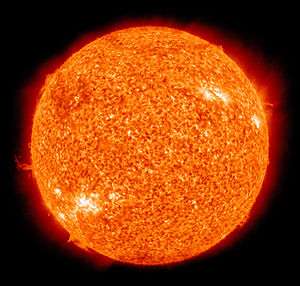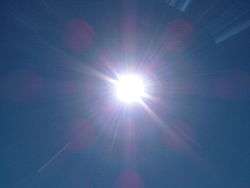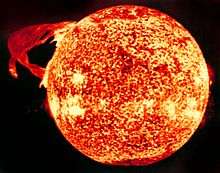Definify.com
Webster 1913 Edition
Sun
Sun
,Sun
,Webster 1828 Edition
Sun
SUN
, n.SUN
,Definition 2026
Sun
Sun
English


Proper noun
Sun
- The star at the center of the Solar System, represented in astronomy and astrology by ☉.
- (newspapers) An English tabloid newspaper.
Related terms
Translations
|
|
|
|
Noun
Sun
- Abbreviation of Sunday.
Translations
Anagrams
sun
sun
English
Alternative forms


- (proper noun, star which the Earth revolves around): (capitalized) Sun
Proper noun
the Sun
- The star that the Earth revolves around and from which it receives light and warmth.
- 1913, Joseph C. Lincoln, chapter 1, in Mr. Pratt's Patients:
- 'Twas early June, the new grass was flourishing everywheres, the posies in the yard—peonies and such—in full bloom, the sun was shining, and the water of the bay was blue, with light green streaks where the shoal showed.
-
Usage notes
- While the Sun by tradition is typically regarded as masculine, the noun itself was originally feminine in grammatical gender.
Translations
|
|
Noun
sun (plural suns)
- (astronomy) A star, especially when seen as the centre of any single solar system.
- The light and warmth which is received from the sun.
- Shakespeare
- Lambs that did frisk in the sun.
- Shakespeare
- (figuratively) Something like the sun in brightness or splendor.
- Bible, Psalms lxxiv. 11
- For the Lord God is a sun and shield.
- Eikon Basilike
- I will never consent to put out the sun of sovereignity to posterity.
- Bible, Psalms lxxiv. 11
- (chiefly literary) Sunrise or sunset.
- 1609-11, William Shakespeare, Cymbeline, Act III, Scene 2:
- Imogen: […] Pr'ythee, speak, / How many score of miles may we well ride / 'Twixt hour and hour / Pisanio: One score, 'twixt sun and sun, / Madam, 's enough for you; and too much too. / Imogen: Why, one that rode to his execution, man, / Could never go so slow.
- 1621, Robert Burton, The Anatomy of Melancholy, p.184 (republished 1832):
- whilst many an hunger-starved poor creature pines in the street, wants clothes to cover him, labours hard all day long, runs, rides for a trifle, fights peradventure from sun to sun, sick and ill, weary, full of pain and grief, is in great distress and sorrow of heart.
- 1849, Henry David Thoreau, A Week on the Concord and Merrimack Rivers, published 1873, page 357:
- I love these sons of earth every mother's son of them, with their great hearty hearts rushing tumultuously in herds from spectacle to spectacle, as if fearful lest there should not be time between sun and sun to see them all, and the sun does not wait more than in haying-time.
- 1962, Harry S. Truman, Public Papers of the Presidents of the United States: Harry S. Truman, page 651:
- You see, the President has five jobs, any one of which would be more than a full-time job for one man; but I have to do all five of them between sun and sun.
- 1997, Alan Dean Foster, Howling Stones, page 149:
- “Tomorrow at first sun.” Not being much of a morning person, she winced internally. “First sun?” “It is the proper time, when the flowers of the pohoroh first open to the light.”
-
Derived terms
Related terms
|
Translations
|
|
|
|
|
|
Verb
sun (third-person singular simple present suns, present participle sunning, simple past and past participle sunned)
- (transitive) To expose to the warmth and radiation of the sun.
- 1898, Winston Churchill, chapter 2, in The Celebrity:
- Sunning himself on the board steps, I saw for the first time Mr. Farquhar Fenelon Cooke. He was dressed out in broad gaiters and bright tweeds, like an English tourist, and his face might have belonged to Dagon, idol of the Philistines. A silver snaffle on a heavy leather watch guard which connected the pockets of his corduroy waistcoat, together with a huge gold stirrup in his Ascot tie, sufficiently proclaimed his tastes.
- Beautiful bodies lying on the beach, sunning their bronzed limbs.
-
- (transitive) To warm or dry in the sunshine.
- (intransitive) To be exposed to the sun.
- (intransitive, alternative medicine) To expose the eyes to the sun as part of the Bates method.
Translations
|
|
See also
Etymology 2
Noun
sun (plural sun)
- A traditional Japanese unit of length, approximately 30.3 millimetres (1.193 inches).
Statistics
Anagrams
Bambara
Etymology 1
Noun
sun
- trunk (of tree)
Usage notes
Often used in a compound with the name of a tree to indicate that kind of tree.
Etymology 2
From Arabic صَوْم (ṣawm, “fasting; abstaining from food, drink, and sex”), from Classical Syriac ܨܘܡܐ (ṣawmāʾ)
Noun
sun
Noun
sun
- to fast
Finnish
Etymology 1
Conjunction
sun
- (coordinating) A coordinating conjunction expressing generality
- En nyt jouda, kun tässä on sitä sun tätä tekemistä.
- I don't have time for that because I have this and that to do (miscellaneous stuff/things to do).
- Lautanen oli täynnä makaroonilaatikkoa, makkaraa, salaattia, perunamuussia sun muuta pöperöä.
- The plate was full of macaroni casserole, sausage, salad, mashed potatoes and other grub.
- En nyt jouda, kun tässä on sitä sun tätä tekemistä.
Etymology 2
From the standard language form sinun (“your, yours”)
Pronoun
sun
- (colloquial) Genitive form of sä.
Kaingang
Pronunciation
- IPA(key): /ˈʃudn/
Verb
sun
References
- ↑ “sun” in Editora Esperança, Dicionário Kaingang-Português Português-Kaingang, Ursula Gojtéj Wiesemann, 2nd edition, 2011, page 83.
Mandarin
Romanization
sun
Usage notes
- English transcriptions of Mandarin speech often fail to distinguish between the critical tonal differences employed in the Mandarin language, using words such as this one without the appropriate indication of tone.
Mimi of Nachtigal
Etymology
Similar to (and likely a borrowing of, or possibly the lender of) the word used for water in the "third Mimi" language, Amdang sunu, which in turn is (per Starostin) "most likely cognate with Fur suːn ‘waterhole, well’".
Noun
sun
References
- George Starostin, On Mimi
North Frisian
Etymology
From Old Frisian sand, from Proto-Germanic *samdaz. Cognates include West Frisian sân.
Noun
sun n (plural sun)
Derived terms
- sunbonk
- sunbeenk
- sunglees
- sunig
- sunkast
- sunkurn
- sunkuuk
- sunküül
- sunpapiar
- sunrag
- sunseek
- sunskol
- sunstoof
- sunstrun
- suntoort
- sunwaal
- sunwai
Old Danish
Etymology
From Old Norse sonr, sunr, from Proto-Germanic *sunuz.
Noun
sun m (nominative plural synær)
Descendants
- Danish: søn
Quiripi
Noun
sun
- (Unquachog) stone
References
- 1791, Thomas Jefferson, A vocabulary of the Language of the Unquachog Indians
Romanian
Etymology 1
Verb
sun
- first-person singular present tense form of suna.
- first-person singular subjunctive form of suna.
Etymology 2
Probably from Latin sonus, or from the verb suna.
Noun
sun n (plural sunuri)
- (archaic) sound
Synonyms
Scots
Etymology
From Old English sunne, from Proto-Germanic *sunnǭ, from heteroclitic inanimate Proto-Indo-European *séh₂wl, genitive *sh₂uln-ós (“of the sun”).
Pronunciation
- IPA(key): /sʌn/, /sɪn/
Noun
sun (plural suns)
Derived terms
Vietnamese
Pronunciation
- (Hà Nội) IPA(key): [s̪un˧˧]
- (Huế) IPA(key): [ʂun˧˧]
- (Hồ Chí Minh City) IPA(key): [ʂʊwŋ͡m˧˥]
Verb
sun
- (intransitive) to shrink
- (transitive) to pull together
- sun vai
- to pull one’s shoulders together
- sun vai
References
- "sun" in Hồ Ngọc Đức, Free Vietnamese Dictionary Project (details)